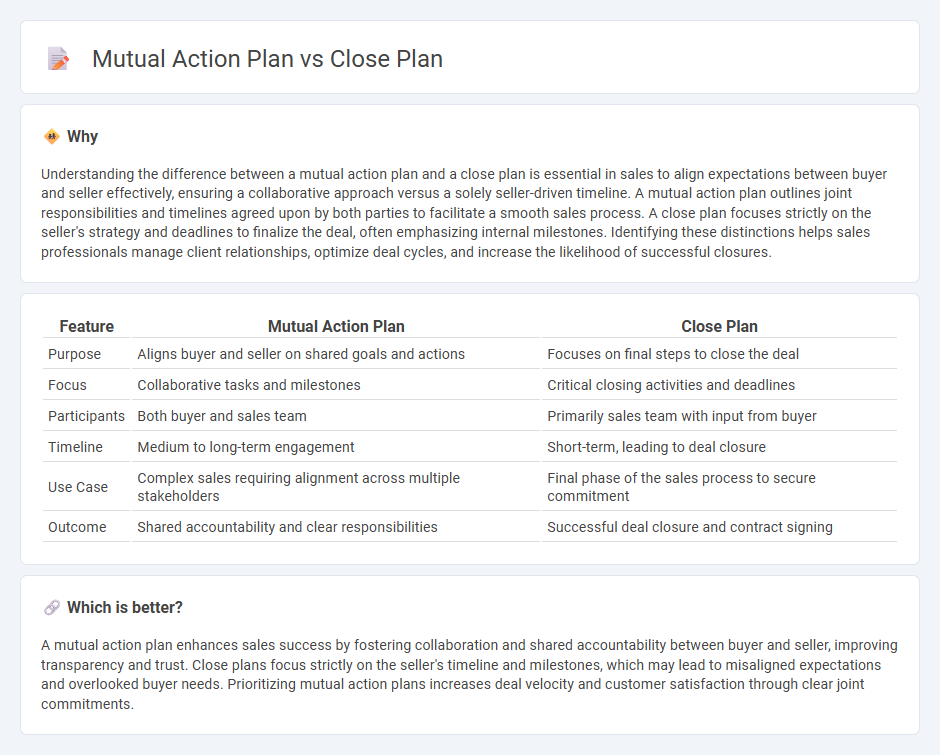
A Mutual Action Plan aligns sales teams and clients by outlining shared goals, responsibilities, and timelines to ensure collaboration throughout the sales process. A Close Plan focuses specifically on the final steps required to secure a deal, detailing critical deadlines, decision-makers, and necessary approvals to expedite closing. Explore how choosing the right strategy can streamline your sales cycle and boost conversion rates.
Why it is important
Understanding the difference between a mutual action plan and a close plan is essential in sales to align expectations between buyer and seller effectively, ensuring a collaborative approach versus a solely seller-driven timeline. A mutual action plan outlines joint responsibilities and timelines agreed upon by both parties to facilitate a smooth sales process. A close plan focuses strictly on the seller's strategy and deadlines to finalize the deal, often emphasizing internal milestones. Identifying these distinctions helps sales professionals manage client relationships, optimize deal cycles, and increase the likelihood of successful closures.
Comparison Table
| Feature | Mutual Action Plan | Close Plan |
|---|---|---|
| Purpose | Aligns buyer and seller on shared goals and actions | Focuses on final steps to close the deal |
| Focus | Collaborative tasks and milestones | Critical closing activities and deadlines |
| Participants | Both buyer and sales team | Primarily sales team with input from buyer |
| Timeline | Medium to long-term engagement | Short-term, leading to deal closure |
| Use Case | Complex sales requiring alignment across multiple stakeholders | Final phase of the sales process to secure commitment |
| Outcome | Shared accountability and clear responsibilities | Successful deal closure and contract signing |
Which is better?
A mutual action plan enhances sales success by fostering collaboration and shared accountability between buyer and seller, improving transparency and trust. Close plans focus strictly on the seller's timeline and milestones, which may lead to misaligned expectations and overlooked buyer needs. Prioritizing mutual action plans increases deal velocity and customer satisfaction through clear joint commitments.
Connection
A mutual action plan outlines collaborative steps between sales teams and clients to achieve shared objectives, ensuring alignment and transparency throughout the sales process. A close plan builds on this foundation by defining specific actions, deadlines, and responsibilities necessary to finalize the deal efficiently. Together, these plans streamline communication, increase accountability, and accelerate deal closure in sales cycles.
Key Terms
Stakeholder alignment
Close plans prioritize stakeholder alignment by detailing clear, step-by-step actions required to finalize deals, ensuring everyone stays on the same page with deadlines and responsibilities. Mutual action plans emphasize collaboration, outlining shared goals and commitments between parties to foster joint accountability and transparent communication throughout the sales process. Explore how tailored strategies in these plans can optimize stakeholder engagement and boost deal success rates.
Milestones
Close plans primarily concentrate on finalizing deal milestones such as contract signing and payment completion, ensuring key deliverables are achieved to successfully close sales opportunities. Mutual action plans emphasize collaboratively defined milestones, fostering alignment between buyer and seller on tasks, deadlines, and responsibilities to drive deal progress efficiently. Explore deeper insights into how milestone-focused strategies enhance sales execution and partnership synergy.
Responsibilities
A close plan outlines specific tasks and deadlines assigned to each team member to finalize a project or sale efficiently, emphasizing clear individual responsibilities. In contrast, a mutual action plan fosters collaborative commitment by defining shared goals and co-created milestones with responsibilities distributed between all stakeholders. Discover how aligning these plans can enhance accountability and streamline project success.
Source and External Links
How To Build A Close Plan: Why Your Sales Team Needs This ... - tl;dv - A close plan is a collaborative sales roadmap created by the salesperson and the client that outlines key milestones, decision points, and a timeline to close a deal, helping maintain transparency, align expectations, and improve sales efficiency.
Sales Close Plan: The Best Tool to Close Way More Deals [Template] - A sales close plan is a document detailing action items, follow-up steps, and roadblocks to resolve in the final stages of a sale, designed to clarify last-minute questions and improve organization and prospect experience.
How to build a better sales close plan [+free template] - Dock.us - Sales close plans guide sales reps and customers through finalizing a purchase by breaking tasks, deadlines, responsibilities, and outcomes into manageable steps to keep momentum and increase close rates.
 dowidth.com
dowidth.com